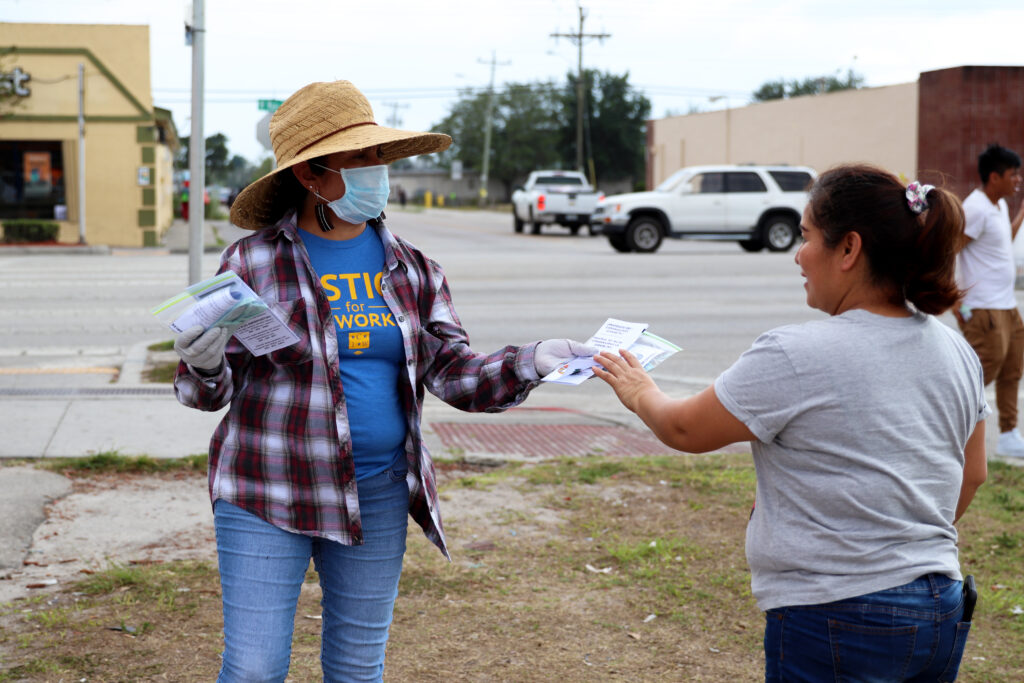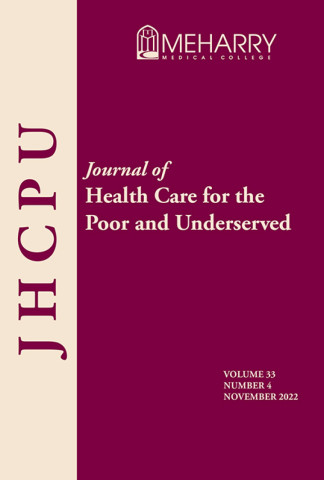
‘Trust has been undervalued in health systems, but the Immokalee experience shows that it may increase participation in community health efforts through operationalizing the factors listed in the trust determination theory.”
“The Immokalee coalition upheld the notion that while technical expertise is critical for building public health infrastructure, community knowledge is equally important for adapting interventions to local needs.”
A new study published in a leading medical journal highlights the importance of strong community ties and trust to ensuring a more resilient and safe community – one that can respond effectively to disasters like the COVID-19 pandemic. Co-written by the CIW’s own Gerardo Reyes Chávez, Greg Asbed, and Julia Perkins, the study contains practical wisdom from the CIW’s collaboration with local and international public health leaders to fight the spread of COVID-19 and immunize thousands of Immokalee community members during the height of the pandemic. The article provides a wealth of lessons for other communities to use to keep their own members safe.
When COVID-19 first began raging through cities and towns across the U.S., Immokalee was one of the hardest-hit, with little medical infrastructure to serve its residents. But Immokalee came together and, together with key partners, forged a path to protect itself against COVID, saving countless lives in the process. This study describes that effort in detail in the hopes that others may be able to replicate its successful fight against a global pandemic.
Read some of the key takeaways from the study below, or read the full article here:
The Immokalee Community Health Coalition: Operationalizing Trust
Journal of Health Care for the Poor and Underserved, Volume 33, Number 4, November 2022 Supplement, pp. 243-254 (Article)
By Caroline Murtagh; Greg Asbed, MS; Emily Ptaszek, PsyD, MBA, FACHE; Fernet Leandre, MD, MMSc-GHD; Vitina Monacello, MSW; Matthew Hing; Julie Pedretti, MBA, FACHE, APR; Frantzso Marcelin; Gerardo Reyes Chávez; Julia Perkins; Ruth DeYoe; Daniel Palazuelos, MD, MPH
“Summary: The COVID-19 pandemic disproportionately affected migrant farmworker communities in the United States in case rates and deaths. In rural Immokalee, Florida, human rights, health care, and social support organizations with different strengths joined together to form a coalition that provided health information, tests, vaccines, and social supports. This report offers practical advice on how similar coalitions can overcome barriers to care, improve outcomes, and overall increase trust in the health system.
Trust affects how health systems function, how patients engage with those systems, and the health results produced. There is a growing literature on the benefits of institutional and interpersonal trust during pandemics, such as lower fatality rates, increased testing participation, and greater willingness to be vaccinated under the Emergency Use Authorization authority of the Food and Drug Administration. The trust determination model of communication asserts that there are four pairs of factors establishing trust: caring and empathy; dedication and commitment; competence and expertise; and honesty and openness. There is less clarity, however, on how health systems can operationalize these factors to build trust in institutions, especially among those who live in low-income and underserved communities. Immokalee, Florida is exemplary: home to a community of immigrant families, migrant farmworkers, and other essential workers, Immokalee is surrounded by an agriculture system that was founded on slavery and continues to be affected by labor legislation that excludes farmworkers from economic and political protections…
Observation 1: ‘With high trust, success comes faster, better, and at lower cost.’
…Recommendation for interpersonal trust. Teamwork is built on reliability and action around a common cause. When organizations share a geographic area, there are myriad barriers to collaboration, from competition for funding to lack of incentive alignment. The urgency presented by COVID-19 required Immokalee coalition members to build trust in each other to act quickly and decisively. For example, the team attended regular meetings to exchange updates regarding staffing, resources, and inter-organizational program implementation. The group also applied for joint funding, which removed competition for limited funding that nonprofits often face…
Observation 2: Pandemics generate worry and self-concern, but well-designed interventions can address vulnerability and augment trust.
…Recommendation for institutional trust. The Immokalee coalition upheld the notion that while technical expertise is critical for building public health infrastructure, community knowledge is equally important for adapting interventions to local needs. The CIW and health promoters played essential roles in elevating community feedback by raising challenges identified through their canvassing efforts during multi-organizational coalition meetings. For instance, the health promoters highlighted concerns about the online portal required to access PCR test results, which informed the development of a rapid test workflow that better met community needs. Similarly, the amount and manner of distribution of cash transfers was adapted based on community feedback; for example, a request to accept informal documents as proof of residence was quickly adopted but would not have been recognized as a need without this input. This demonstration of respect for community concerns aimed to signify to community members that these interventions were trustworthy…
Observation 3: Investments in building trust can yield rewards when planning to rebuild after a catastrophe such as the COVID-19 pandemic.
…Recommendation for institutional trust. Action does not happen through education alone. Instead, the elimination of health inequities requires practicing pragmatic solidarity, shifting power, and redistributing resources. While information dissemination from trusted messengers such as the health promoters was necessary, education alone was insufficient for preventing infection. The team adopted strategies, such as provision of regular testing services and development of a material support system, to mitigate health barriers and augment agency…
…Trust has been undervalued in health systems, but the Immokalee experience shows that it may increase participation in community health efforts through operationalizing the factors listed in the trust determination theory. Nevertheless, trust is fragile and shaped by daily interactions with a growing misinformation industry on social media and the larger health system. More can be done to build institutional trust, such as increasing diversity in the health care workforce and further improving the quality of health care services outside of COVID-19; the ultimate test, however, will be to find ways to extend the same energy and pragmatic solidarity demonstrated by this group to address the broader structures that left this community, and too many like it, vulnerable in the first place.”

